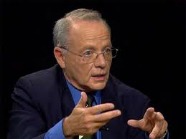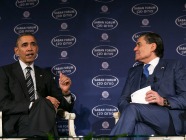As you know, there are always new challenges along the path to peace. Volatility in the Middle East, new policy makers and political pressure from all sides, and a continually evolving landscape in and around Israel create seemingly endless obstacles to peace. At Americans for Peace Now, however, we believe peace is possible. But we know it takes work. Working together, we are confident that we can educate, advocate, and serve as a strong voice that will lead toward peace, security, and stability for Israel.
Planned Giving- Why We Need Your Help
A few months ago, I met Noam, an inspiring Israeli high-school student. After my lecture he approached me and explained how in his school, he is seen as a traitor and as an unpatriotic Israeli. Noam explained that he is very much a patriotic Israeli, and out of his love for Israel, he wants to see peace with the Palestinians.
They Say/We Say: You've heard their argument, Now, we'll have ours.
What survey results show
In July of 2013, the government of Israel and the Palestinian Authority agreed to begin a nine- month period of
talks, under U.S. sponsorship, to see if agreement could be achieved on a basic framework for a final settlement of
the Israel-Palestinian conflict.

The Israeli right's eulogies for the South African freedom fighter ranged from unawareness to hypocrisy. Even
if there is not full symmetry between apartheid and the occupation, Israel still stands for everything Mandela
fought against
Why aren't the Netanyahus going to Nelson Mandela's funeral? The reason is surely not the high costs of the flight
(after all, the budget for the couple's attendance of Thatcher's funeral was found without difficulty) nor a sudden
fit of humility. Yet still, the Prime Minister is looking for any excuse to avoid standing next to the world's
leaders to pay last respects to the man who fought and defeated the apartheid regime - and he knows why.
APN's daily news review from Israel
Tuesday December 10, 2013
Quote of the day:
"It looks like a trick' by someone who does not really want an historic agreement with the neighboring
people."
--In a Letter to the Editor, an Israeli reader says Netanyahu's demand for Palestinian recognition of a
'Jewish state' is a ploy.**

Veteran Israeli political analyst Akiva Eldar was the guest of an APN briefing call on December 9th, commenting on the Israeli-Palestinian negotiations, about the West's interim agreement with Iran, and about the impact of the two processes on US-Israeli relations

We Israelis often complain that 'there is no one to talk to.' But for many young Palestinians, Israelis are a
lost cause - and anti-normalization means there is less interaction than ever to prove this wrong.
By Ori Nir
I recently met with a group of about a dozen young reporters and photojournalists from the West Bank. I asked them
whether they had any contacts with Israeli journalists and was shocked to hear they did not. I told them that when
I covered Palestinian affairs for Haaretz in the 1980s and '90s, Palestinian journalists were my primary sources -
and my good friends. Back then, journalists on both sides of the Israeli-Palestinian divide sought contact with
each other, first and foremost because they thought their readers needed and wanted to know about their neighbors.

This week, Alpher discusses the seemingly significant high-level developments and statements regarding both the Israel-Arab peace process and Iran, against the backdrop of Israeli-American relations, how does the American security plan or "thoughts" challenge Netanyahu's security concept regarding the Jordan Valley, what is the significance of Obama's mention of a framework agreement as a negotiating outcome, what is the significance of Netanyahu's linkage of Iran and the two-state solution at the Saban Forum, and thoughts on Nelson Mandela's support for the Palestinians and consistent criticism of Israel.
